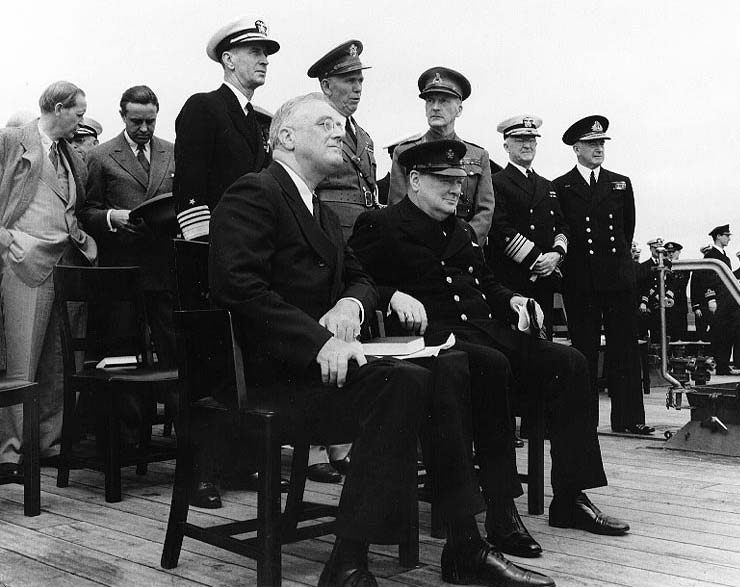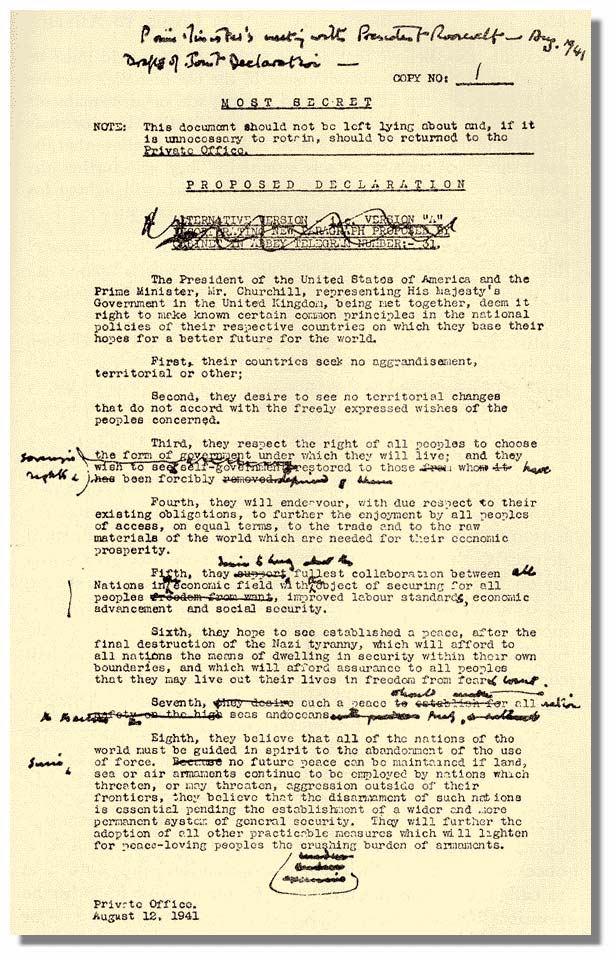 The Atlantic Charter was a policy statement, signed by the U.S. and Britain, in August of 1941, early during WWII, to establish what the parties wanted to happen post-war time; after the initial signing, it was also agreed upon by the other allies. The charter set out 8 goals, rather than try to set out a blueprint of what exactly had to happen following the war. GATT (General agreement on trades & tariffs) and post war European independence, and other documents and goals were derived from the Atlantic Charter.
The Atlantic Charter was a policy statement, signed by the U.S. and Britain, in August of 1941, early during WWII, to establish what the parties wanted to happen post-war time; after the initial signing, it was also agreed upon by the other allies. The charter set out 8 goals, rather than try to set out a blueprint of what exactly had to happen following the war. GATT (General agreement on trades & tariffs) and post war European independence, and other documents and goals were derived from the Atlantic Charter.
The Aim
The main aim of the Atlantic Charter was to show that the U.S. was supporting U.K. during the war time. Both countries wanted to show a united front, and the mutual hopes they wanted, for a post-war world, and after defeating the Nazi regime. One of the main focuses was that on peace after the war, and not so much so the U.S. strategy and involvement. One of the main U.S. aims with the Atlantic Charter was to change the way British policies were viewed, in regards to the Empire. The U.S. wanted to build an open door policy, which was counter intuitive to the way the British generally viewed politics and their reliance on other nations for assistance.
The Eight Goals
 The Atlantic Charter set out the 8 goals that the U.K., U.S., and Allies wanted, after the war. These were:
The Atlantic Charter set out the 8 goals that the U.K., U.S., and Allies wanted, after the war. These were:
– There would be no territorial gains, neither by the U.S. nor by Britain.
– Any territorial adjustments that were made, would have to be in accord with the wishes of the people who were involved and concerned with those changes.
– All people would have a right to self-determination.
– The barriers that were present on trade, would be lowered after the war’s conclusion.
– Global economic cooperation and an advancement on social welfare, were to be made.
– Participants would work to create a world that was free of want and free of fear.
– Freedom of the seas was another goal that the participants would work together to attain; and,
– Disarmament of aggressor nations was a central goal.
These were not set in stone but were the agreements and goals that both nations, as well as the allies, hoped to attain upon the Atlantic Charter agreement.
Inter-Allied & United Nations Acceptance
At the Inter-Allied council meeting, on September 24, 1941, the Atlantic Charter was unanimously agreed upon by additional nations. Some of the government officials included: Belgium, Czech, Greece, Norway, Poland, and the Netherlands. All of these nations agreed to the acceptance of the terms, and the principle policies that were set forth in the Atlantic Charter. Early in 1942, additional countries showed their support, and the Joint Declaration by the United Nations was issued, in order to show that these nations wanted to defeat Hitler and the Nazi regime.
The Impact
Once entered and agreed upon, the Atlantic Charter was used to show the goals that were set forth, and the attempt to end the war. The Axis powers viewed these agreements as a potential alliance that was built up against them. A more defensive approach was taken following this agreement, by Japan, against the U.S. and Britain.
The British used flyers, and dropped millions over Germany, in an attempt to show the want for peace, if German forces were taken down. The Atlantic Charter was cited as an authority statement, and tried to show how Germany, as well as other nations, would be able to achieve peace post war.
The charter was used more as a means to show what could be, and what the U.S. and U.K. were trying to do, as opposed to being a threat. It was to show that with the defeat of Hitler, peace was possible, and that with proper changes, all sides would make out better with the take down of German forces.
The Atlantic Charter is one of many charters and documents that were agreed upon during the war. It was a mechanism for peace, for deriving peace, and what would be required to make peace with all nations. With many proponents, it was an agreement that was signed by several world leaders in an attempt to bring down Hitler and his Nazi regime.